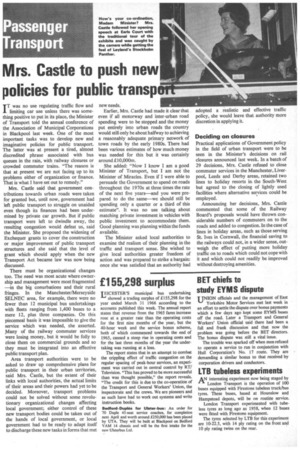Mrs. Castle to push new policies for public transp
Page 60

If you've noticed an error in this article please click here to report it so we can fix it.
IT was no use regulating traffic flow and limiting car use unless there was something positive to put in its place, the Minister of Transport told the annual conference of the Association of Municipal Corporations in Blackpool last week. One of the most important tasks was to develop new and imaginative policies for public transport.
The latter was at present a tired, almost discredited phrase associated with bus queues in the rain, with railway closures or crowded commuter trains. "The reason is that at present we are not facing up to its problems either of organization or finance. That is what I have set out to remedy."
Mrs. Castle said that government contributions towards urban roads were taken for granted but, until now, government had left public transport to struggle on unaided even though its finances had been undermined by private car growth. But if public transport were left to dwindle away, the resulting congestion would defeat us, said the Minister. She proposed the widening of Exchequer grants to cover the construction or major improvement of public transport structures and she said that the level of grant which should apply when the new Transport Act became law was now being discussed.
There must be organizational changes too. The need was most acute where ownership and management were most fragmented —in the big conurbations and their rural fringes. In the Manchester/Merseyside SELNEC area, for example, there were no fewer than 12 municipal bus undertakings with fleets ranging from 1,400 buses to a mere 12, plus three companies. On this piecemeal basis it was impossible to give the service which was needed, she asserted. Many of the railway commuter services were losing money, but it would be folly to close them on commercial grounds and so they must be integrated into an effective public transport plan.
Area transport authorities were to be asked to draw up comprehensive plans for public transport in their urban territories, said Mrs. Castle, but the extent of their links with local authorities, the actual limits of their areas and their powers had yet to be decided. Moreover, transport problems could not be solved without some revolutionary organizational changes affecting local government; either control of these new transport bodies could be taken out of the hands of local government, or local government had to be ready to adapt itself to discharge these new tasks in forms that met new needs.
Earlier, Mrs. Castle had made it clear that even if all motorway and inter-urban road spending were to be stopped and the money put entirely into urban roads the country would still only be about halfway to achieving a reasonably adequate primary network of town roads by the early 1980s. There had been various estimates of how much money was needed for this but it was certainly around £10,000m.
She added: "Now I know I am a good Minister of Transport, but I am not the Minister of Miracles. Even if I were able to persuade the Government to spend on roads throughout the 1970s at three times the rate of the next five years—and you were prepared to do the same—we should still be spending only a quarter or a third of this estimate". It was no use talking about matching private investment in vehicles with public investment to accommodate them. Good planning was planning within the funds available.
The Minister asked local authorities to examine thd realism of their planning in the traffic and transport sense. She wished to give local authorities greater freedom of action and was prepared to strike a bargain: once she was satisfied that an authority had Deciding on closures Practical applications of Government policy in the field of urban transport were to be seen in the Minister's decisions on rail closures announced last week. In a batch of 29 decisions, Mrs. Castle refused to close commuter services in the Manchester, Liverpool, Leeds and Derby areas, retained two lines to holiday resorts in the South-West but agreed to theclosing of lightly used facilities where alternative services could be employed.
Announcing her decisions, Mrs. Castle commented that some of the Railway Board's proposals would have thrown considerable numbers of commuters on to the roads and added to congestion. In the case of lines in holiday areas, such as those serving St. Ives in Cornwall, the financial saving to the railways could not, in a wider sense, outweigh the effect of putting more holiday traffic on to roads which could not cope with it and which could not readily be improved without destroying amenities.
















































































































































































































